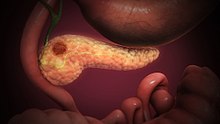
Cancer tumors have a different microbiome (community of microbes) than healthy tissue. Researchers have been finding the bacteria Fusobacterium nucleatum (F. nucleatum) in a number of cancers, with high levels of its presence associated with a poorer outcome for the person (more metastases and death).
A recent study found that one strain or subtype of F. nucleatum (called Fna C2) is found in tumors of about 50% of aggressive colon cancers.
Interestingly, F. nucleatum is a normal oral bacteria - one found in the mouth of people, and also associated with periodontal disease. It is rarely found in the gastrointestinal (GI) tract of healthy persons.
It is thought that the bacteria somehow travels from the mouth to the stomach, where it can withstand stomach acid, and then grows there in the gastrointestinal tract. F. nucleatum is cancer promoting - for example, it has a supporting role in tumor progression. It appears to be resistant to cancer treatments.
Researchers are now wondering if certain beneficial or good bacteria ingested by the person or somehow delivered to the tumor site can battle the F. nucleatum, perhaps as part of cancer therapy. Stay tuned....
From Science Daily: Bacteria subtype linked to growth in up to 50% of human colorectal cancers
Researchers at Fred Hutchinson Cancer Center have found that a specific subtype of a microbe commonly found in the mouth is able to travel to the gut and grow within colorectal cancer tumors. This microbe is also a culprit for driving cancer progression and leads to poorer patient outcomes after cancer treatment. ...continue reading "A Specific Bacteria and Colorectal Cancer"

